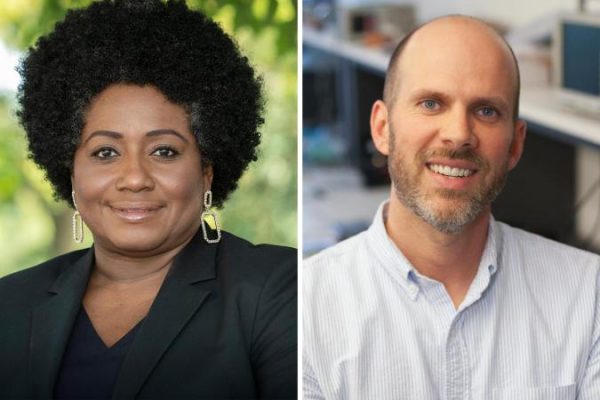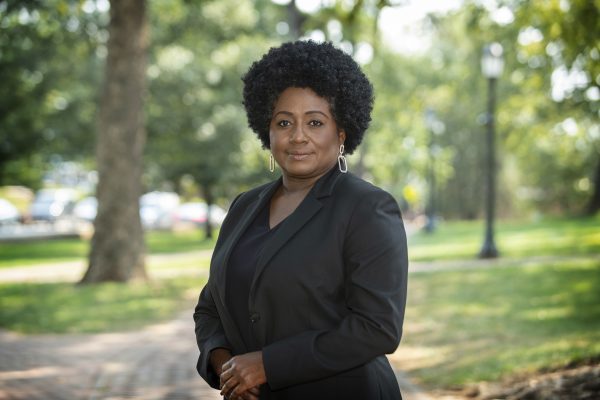Navigating AI Ethics and Data Activism with Renée Cummings
Data activist and ethicist Renée Cummings recently discussed the impact of artificial intelligence on data and society, how it is redefining the data power structure, and what approaches researchers might take to define AI ethics.
“There is no AI without data,” Cummings said at the outset of her hour-long talk, which was sponsored by the University of Virginia’s Office Engagement and attended by more than 100 alumni and others interested in these critical issues.
Cummings pointed out how extraordinary AI can be, transforming every discipline and industry, and helping solve some of the world’s greatest questions.
“Data is the lifeblood of AI, and we’re seeing extraordinary possibilities,” said Cummings. “It’s stretching the imagination, and we see AI being used for innovation and progress.”
Not all data is created equally, and Cummings pointed out that data is never free from human judgment. “It is often perceived as just math or statistics, which gives it an appearance of neutrality,” said Cummings. She warned, however, that that way of thinking has been debunked, referencing pioneering women in ethical data science like Cathy O’Neil, Meredith Broussard, and Virginia Eubanks.
"With progress comes power and privilege,” stated Cummings. She cautioned that data is often about monetization, and “where there’s monetization there is monopolization and other outcomes like oppression, exploitation, and weaponization.”
Cummings explained that because data is human-made and human-driven, it is by nature flawed. “Many of the datasets that we’re using to make data-driven decisions—or what we call algorithmic decision-making—are based on historically biased data.”
Historical data is data collected in the past about events and circumstances pertaining to a particular subject. Because collection was primarily done by humans, and humans are not perfect, then the data itself is imperfect.
“Historical data is used to build new AI systems and the exciting emerging technologies we’re seeing,” said Cummings. “We must realize that many of these datasets carry with them history and memory, some deeply destructive.” She pointed out that data does not have the luxury of historical amnesia—it can’t forget—and so decisions made in the past have embedded themselves into many of the current datasets we are using.
As an example, Cummings referred to Joy Buolamwini whose research discovered that bias had crept into facial recognition systems from companies like Google, Microsoft, IBM, and Amazon. Buolamwini determined that 77.4% subjects in mainstream datasets are male and up to 94.6% are lighter skin males. Because AI systems were trained on these datasets of mostly white men, they were great at recognizing pale males but bad at recognizing women and people of color.
This imperfect data is being used to codify bias and discrimination, and that is dangerous, according to Cummings. But how to close the gap between data’s computational and cultural meanings? “Data activism is about challenging the status quo and to advocate for change.”
Cummings was the first data-activist-in-residence at the University of Virginia’s School of Data Science. She is a member of the World Economic Forum’s Global Futures Council on Data Equity and an active speaker on the national and international stages for her work on ethical AI and technologies. In the last year, she has been a featured speaker around the world, ranging from presentations to high school students to a roundtable discussion on AI-focused legislation at the European Union Parliament in Brussels.
She has made television appearances – offering expert analysis in criminology and criminal psychology on iCrime with Elizabeth Vargas – and has been named to several “best of” lists, including the “Top 50 Innovators in AI” (named by World Summit AI) and “50 Influential Women” (named by InspiredMinds!). In 2021. she was listed on the "100 Brilliant Women in AI Ethics" list published by Women in AI Ethics.
Cummings fell in love with data while working as a criminologist and trying to better understand homicide statistics. She admitted, “I wanted to understand what was creating gun violence and why homicides were so high. This raised questions about legal cynicism and due process.”
Cummings wrapped up her presentation by challenging the audience to be guardians of their own data and to advocate for data ethics. “How, as a society, might we build AI that is resilient, rewarding, and responsible? How can we ensure AI will benefit all?” She reminded the audience that it is everyone’s responsibility to question whether data and the way it is being used are creating harm, regardless of whether intentional or not.
“Duty of care is critical,” she said. “Stand firm and stand tall in this space,” she told the audience. “It is everyone’s responsibility to bring greater equity and accountability and transparency to decision making.”


